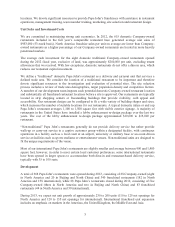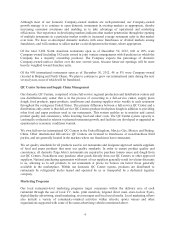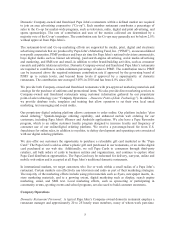Papa Johns 2012 Annual Report Download - page 19
Download and view the complete annual report
Please find page 19 of the 2012 Papa Johns annual report below. You can navigate through the pages in the report by either clicking on the pages listed below, or by using the keyword search tool below to find specific information within the annual report.13
Our dependence on a sole supplier or a limited number of suppliers for some ingredients could result in
disruptions to our business.
Domestic restaurants purchase substantially all food and related products from our QC Centers.
Domestically, we are dependent on sole suppliers for our cheese and flour products, and internationally
we are dependent on a sole supplier for substantially all our cheese. Alternative sources may not be
available on a timely basis to supply these key ingredients or be available on terms as favorable to us as
under our current arrangements. Our corporate and franchised restaurants could also be harmed by any
prolonged disruption in the supply of products from or to our QC Centers due to weather, crop disease,
and other events beyond our control. Insolvency of key suppliers could also negatively impact our
business.
Our international operations are subject to increased risks and other factors that may make it more
difficult to achieve or maintain profitability or meet planned growth rates.
Our international operations could be negatively impacted by changes in international economic, political
and health conditions in the countries in which the Company or our franchisees operate. In addition, there
are risks associated with differing business and social cultures and consumer preferences, diverse and
sometimes uncertain or unstable government regulations and structures, limited availability and high cost
of suitable restaurant locations, and difficulties in sourcing high-quality ingredients and other
commodities in a cost-effective manner. In addition, our international operations are subject to additional
factors, including compliance with anti-corruption and other foreign laws, and various currency
regulations and fluctuations. Accordingly, there can be no assurance that our international operations will
maintain profitability or meet planned growth rates.
We are subject to numerous laws and regulations governing our workforce and our operations. Changes
in these laws, including health care legislation and minimum wage increases or additional laws could
increase costs for our system-wide operations.
Domestic system-wide restaurant operations are subject to federal and state laws governing such matters
as wages, benefits, working conditions, citizenship requirements and overtime. A significant number of
hourly personnel employed by our franchisees and us are paid at rates closely related to the federal and
state minimum wage requirements. Accordingly, further increases in the federal minimum wage or the
enactment of additional state or local minimum wage increases above federal wage rates would increase
labor costs for our system-wide operations. Additionally, current conditions may make it easier for
workers to form unions, potentially resulting in higher costs. Local government agencies have also
implemented ordinances that restrict the sale of certain food or drink products. Compliance with
additional government mandates, including menu labeling requirements, could increase costs and be
harmful to system-wide restaurant sales.
U.S. health care reform law enacted in 2010 requires employers such as us to provide health insurance for
all qualifying employees or pay penalties for not providing coverage. We are evaluating the impact the
new law will have on our domestic operations, and although we cannot predict with certainty the financial
impact of the legislation, we, like other industry competitors, expect that the requirement that we provide
more extensive health benefits to employees than we currently provide, and/or fund a larger portion than
previously funded, could impact our results of operations beginning in 2014.
Domestically and internationally, we operate in an increasingly complex regulatory environment, and the
cost of regulatory compliance is increasing. Failure to comply with applicable U.S. and international
labor, health care, food, anti-bribery and corruption, consumer and other laws, may result in civil and
criminal liability, damages, fines and penalties. This could harm our reputation, limit our ability to grow
and adversely affect our financial performance.
























